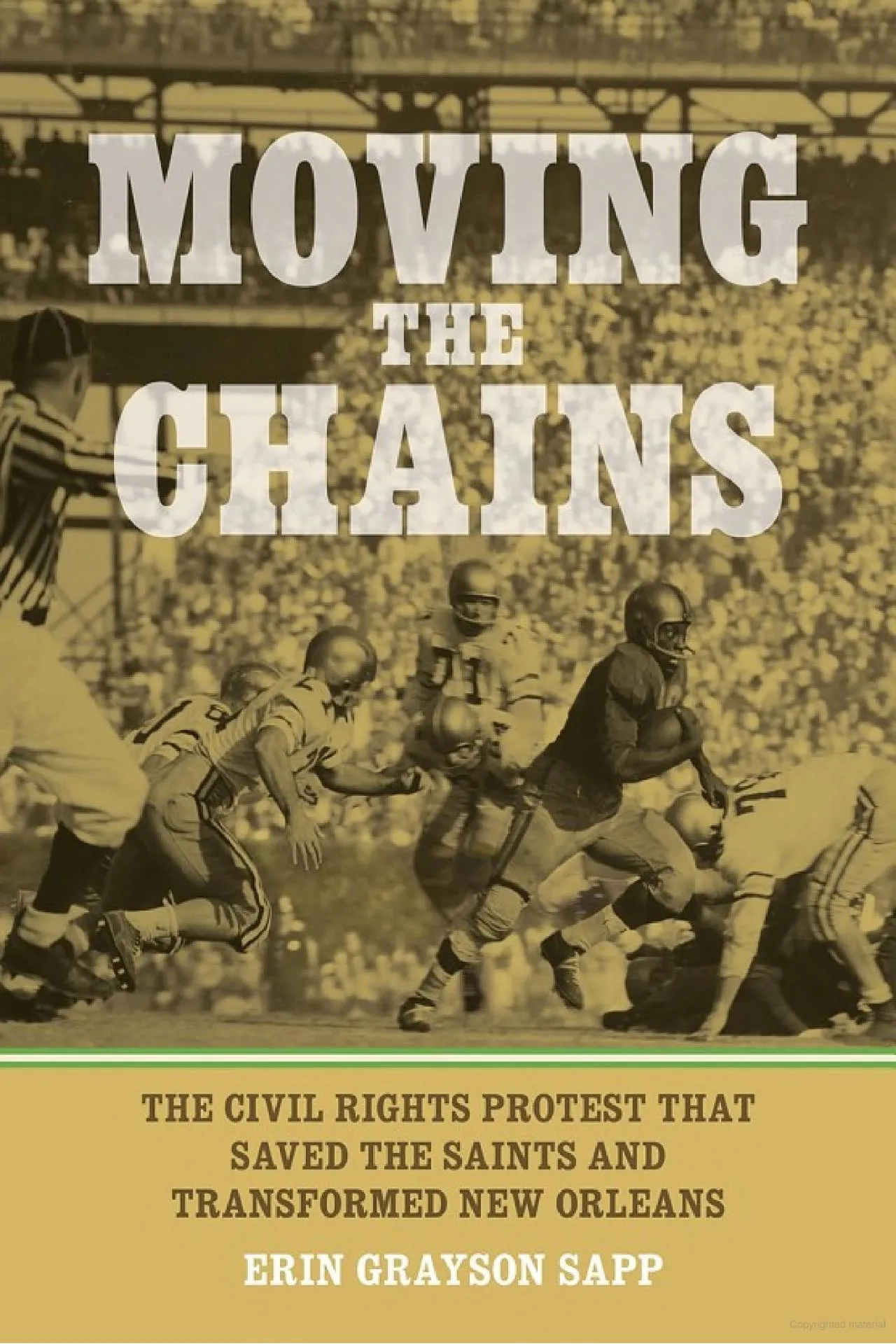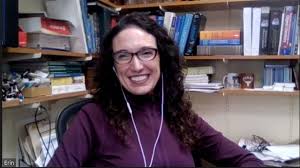
Erin Grayson Sapp was a student in the School of Liberal Arts' interdisciplinary PhD program — focusing on civil rights — when she first learned about the 1965 AFL All-Star Game and the January day when 58 Black and white players walked out of the Tulane Stadium to protest New Orleans' lingering segregation laws and discrimination against Black teammates. As Sapp continued her research, she discovered just how closely the Civil Rights movement was tied to the fate of football in New Orleans. Now, as the city prepares to host the 59th Super Bowl in February, her new book Moving the Chains: The Civil Rights Protest That Saved the Saints and Transformed New Orleans spotlights this pivotal moment in American sports history and its defining role in creating both the New Orleans Saints and the Super Bowl itself.
To understand the context of the walkout, Sapp studied a decade’s worth of sources on the city’s racial struggles and sports history. After earning her PhD in English and American History, she became a scholar-in-residence at the Historic New Orleans Collection, where access to invaluable archives helped transform her initial term paper into this major project.
In 1965, despite its role as longstanding host of the Sugar Bowl, New Orleans was not yet a football city — especially since integrated university teams and clubs across the nation refused to play here due to the fact that the city was holding onto Jim Crow-era segregation laws. When players arrived for the All-Star Game in January of that year, Sapp explained over email, “The All-Stars were expecting a week of celebration, but instead, the Black players were turned away from taxis, restaurants, and nightclubs.” When Black players checked in at the Roosevelt Hotel alongside their white teammates, they were told they would have to use the side entrance. Their mistreatment reflected the racist policies that ruled the city, creating a mixed atmosphere of apathy and turmoil.
The All-Star boycott had the power to break through some of this apathy. “In New Orleans, before the walkout, civil rights progress largely took place slowly and quietly, behind closed doors,” Sapp shared. “The walkout gave citizens a popular cause to rally behind, a shared reason to openly promote progress.”
The game was meant to be a crucial stepping stone toward giving the city its own professional football franchise — something locals believed was just out of reach. “With the All-Star Boycott,” Sapp explained, “suddenly racial conservatism was football obstructionism. In a striking reversal of old trends, widespread change took place very openly and quickly after the walkout.” By 1966, when three Black players returned to New Orleans, their cab driver took them right to an oyster restaurant in the French Quarter.
“The driver explained that those guys didn’t realize the impact they had,” Sapp emphasized. “The city wanted pro football so badly they had accelerated integration, meaning cabs, cafes, and clubs were open to everyone.”
On February 3, 2025, mere weeks after the 60th anniversary of the All-Star Game walkout, two players — Pro Football Hall of Famers Bobby Bell of the Chiefs and Ron Mix of the Chargers — will return to New Orleans and join Sapp for a talk at Tulane School of Law. The two are among the many 1965 All-Star players who went on to major pro football careers, winning awards and Super Bowls — while often using their platforms to continue advocating for social change. “This was a very early example of activism in American sports,” Sapp stated. “And they had no idea what the repercussions would be. They had a monumental impact that wasn’t even lost over time, but rather downplayed in real-time, and just never fully brought to light.”
“Locals have long clung to that colorful story of backroom politics (not serious civil rights reform) as the origin of the Saints,” Sapp remarked. In 1966, two Louisiana congressmen greased the necessary palms to pass antitrust legislation through Congress so that the American Football League and National Football League (NFL) could merge — a move that gave New Orleans hope for their own team and created America’s first Super Bowl. While the rest of the Saints’ origin story is familiar New Orleans lore — a shady quid pro quo between a Louisiana politician and the NFL commissioner — the All-Star Game and its athlete activists get left out of the picture. After the protest, many white New Orleanians became defensive. As the likelihood of getting a pro team increased, New Orleans wanted to prove to the NFL that they were a big-league city and any new progress was “just proof that the city had been had been tolerant all along.” As a result, Sapp said, “Locals largely never admitted change was needed — and never celebrated that it occurred.”
Moving the Chains is the first book to spotlight the All-Star Game boycott and its significance. Sapp found it “heartbreaking” to learn that many All-Star players felt forgotten for their activism. “They deserve to be honored for their courage, action, and impact,” she said. “I only wish more had been during their lifetimes.”

Like all good historians, Sapp excels at connecting dots and uncovering hidden throughlines. The All-Star Game boycott and the progress it ignited helped the city land a pro football franchise; in turn, the Saints redefined New Orleans. With their own team, New Orleans became a major city, football hub, and event destination — hosting their own Super Bowl in 1970 (at Tulane Stadium). Moving the Chains and the All-Star Game legacy further proves how much the Saints mean to New Orleans.
“The power of the team stands out to me as something exceptional, unlike any other league city. And the walkout explains why that is,” Sapp emphasized. And since unity was so key to founding the Saints, she goes on, “From day one, the Saints club was absolutely everyone’s team.”
Order Moving the Chains: The Civil Rights Protest That Saved the Saints and Transformed New Orleans from LSU Press and other booksellers, and stay tuned to register for the February 3 event at Tulane School of Law.

